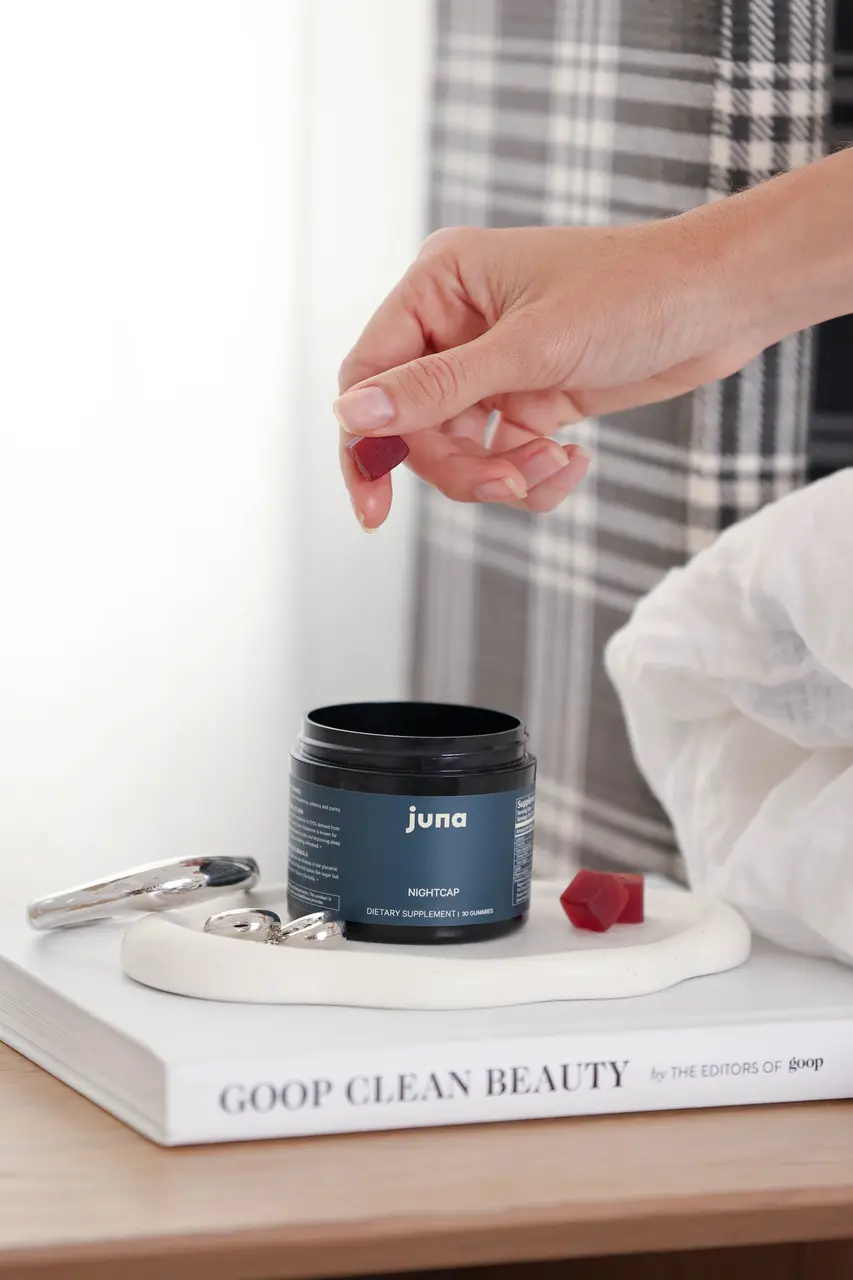
Are REM Sleep Supplements Safe for Daily Use?
Getting a good night’s sleep is crucial for both our physical and mental health. With the increasing popularity of REM sleep supplements, many wonder about their safety and efficacy for daily use. This blog aims to shed light on REM sleep supplements, their benefits, potential side effects, and how to use them responsibly.
What Are REM Sleep Supplements?
At their core, REM sleep supplements are designed to promote the phase of sleep associated with dreaming, known as Rapid Eye Movement (REM) sleep. This phase is crucial for cognitive functions such as memory formation and emotional processing. Supplements intended to enhance REM sleep often contain a blend of natural ingredients known for their sleep-facilitating properties.
Meet Juna’s Nightcap Sleep Gummies. They’re not just any sleep supplement; they’ve been carefully formulated with botanicals like passionflower, renowned for encouraging deeper sleep stages when cell renewal can occur. It’s the thoughtful blend of ingredients like tart cherry, chamomile, jujube, and hops, in addition to magnesium with 72 trace minerals, that sets these gummies apart, offering a natural solution to support quality REM sleep.
Many Nightcap users report an increase in Oura ring sleep scores within a week of consistent use. “I’ve been using Juna for months, and I’ve noticed that my deep sleep, the state after REM sleep on my Oura ring increased by 2-3 hours per night.” Ruvini Wijetilaka, MD Internal Medicine Physician
Benefits of REM Sleep Supplements
The primary benefit of REM sleep supplements is their ability to potentially enhance the quality of sleep. Improved REM sleep has been linked to numerous health benefits, including better cognitive function, mood regulation, and overall well-being. Users often report feeling more refreshed and alert upon waking.
In addition to cognitive and mood enhancements, supplements can play a crucial role in stress management. By facilitating deeper sleep, they can help in reduce cortisol levels, thereby relieving stress. This is vital in today’s fast-paced world, where quality sleep is often compromised.
How to Use REM Sleep Supplements Safely
For safe use of supplements to support REM sleep , start with the lowest recommended dose to see how your body responds. It’s also wise to limit usage to periods when sleep disturbances are most problematic, rather than as a continuous nightly ritual.
Furthermore, integrating these supplements into your routine should be done with the guidance of a healthcare professional, especially if you’re already taking medication for other conditions, or using alcohol to avoid any unwanted interactions.
Alternatives to REM Sleep Supplements
For those looking for alternatives to supplements, focusing on sleep hygiene can be incredibly effective. Establishing a consistent sleep schedule, reducing blue light exposure before bed, and creating a calming bedtime routine are all strategies that can enhance sleep quality naturally.
Exercise and dietary adjustments can also play a significant role. Engaging in regular physical activity and avoiding caffeine and heavy meals before bedtime can significantly impact sleep quality and duration.
Look to healing your gut as well! The Gut/Sleep axis is real and dysbiosis in you gut could be causing sleep issues. The gut/sleep axis refers to the bidirectional relationship between the gut microbiome and sleep. Research has increasingly shown that what happens in your gut can significantly impact your sleep quality, and vice versa. Here’s a closer look at how these two systems interact:
- Neurotransmitter Production: The gut microbiome can influence the production of neurotransmitters and hormones that affect sleep. For instance, certain gut bacteria help produce neurotransmitters like serotonin and gamma-aminobutyric acid (GABA), which are involved in regulating mood and sleep. An imbalance in these bacteria could potentially disrupt these processes and affect sleep quality.
- Inflammation: The gut microbiome plays a role in regulating inflammation in the body. An imbalance, often termed dysbiosis, can lead to chronic inflammation, which has been linked to sleep disorders. For example, higher levels of inflammatory markers can disrupt sleep patterns and contribute to conditions like insomnia.
- Circadian Rhythm: The gut microbiome has its own circadian rhythms that can influence the body’s overall circadian rhythm. Disruption in the microbiome’s daily cycles can potentially impact the body’s sleep-wake cycles.
- Microbial Diversity: Poor sleep can affect the diversity and composition of the gut microbiome. Chronic sleep deprivation or disrupted sleep patterns can lead to a reduction in microbial diversity, which is associated with various health issues, including metabolic disorders and weakened immune function.
- Gut Barrier Function: Sleep plays a role in maintaining the gut barrier, which protects against leaky gut syndrome (where harmful substances can pass through the gut lining into the bloodstream). Poor sleep can compromise this barrier, leading to gastrointestinal problems and systemic inflammation.
- Eating Habits: Sleep disruption often leads to changes in eating habits, such as increased cravings for high-calorie or unhealthy foods. These dietary changes can alter the gut microbiome, potentially exacerbating sleep issues and leading to a cycle of poor sleep and gut imbalance.
- Probiotics and Prebiotics: Some studies suggest that probiotics (beneficial bacteria) and prebiotics (food for beneficial bacteria) may help improve sleep quality. For example, certain strains of probiotics have been shown to reduce anxiety and depressive symptoms, which can indirectly improve sleep.
- Dietary Adjustments: Dietary changes that promote a healthy gut microbiome, such as increasing fiber intake and consuming fermented foods, can positively impact sleep. Maintaining a balanced diet can help support a healthy gut microbiome and, in turn, improve sleep.
Overall, while there’s still a lot to learn, maintaining a healthy gut microbiome through a balanced diet, good sleep hygiene, and potentially targeted probiotic or prebiotic supplementation could be beneficial for improving sleep quality. If you’re experiencing significant sleep issues, consulting with a healthcare provider or a specialist in sleep medicine can help you explore these connections further.
When to Consult a Healthcare Professional
It’s crucial to consult with a healthcare professional before beginning any new supplement regimen, especially if you have pre-existing health conditions or are taking other medications. They can provide tailored advice and ensure the supplements won’t negatively interact with your current health plan.
Additionally, if you find that your sleep issues persist despite trying supplements and making lifestyle changes, a healthcare professional can help identify underlying causes that may require different treatment approaches.
In Summary: Are REM Sleep Supplements Your Nighttime Ally?
Navigating the world of REM sleep supplements can seem daunting, but armed with the right information, you can make an informed decision about their use in your daily routine. Remember, while supplements can aid in improving the quality of your sleep, nothing replaces a healthy sleep hygiene routine. Always consult with a healthcare professional before starting any new supplement regimen to ensure it’s the right choice for your individual health needs.
References:
- PubMed - Passionflower
- PubMed - Magnesium
- PubMed - Sleep Quality
- PubMed - Stress and Sleep
- PubMed - Dependency
- ScienceDirect - Sleep and Medications
- PubMed - Gut and Sleep
- ScienceDirect - Probiotics and Sleep
*These statements have not been evaluated by the Food and Drug Administration. This product is not intended to diagnose, treat, cure or prevent any disease. All information presented here is not meant as a substitute or alternative to information from healthcare practitioners. Please consult your healthcare professional about potential interactions before using any product.


